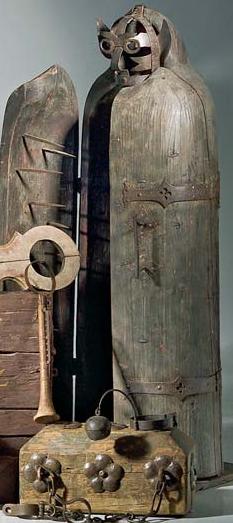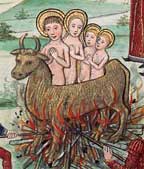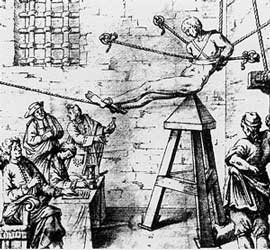Yesterday I talked about how if the cruelty of man is in many ways inconceivably evil to the average person, how could we understand supernatural evil?
Today I wonder the same thing... about the forces of good.
I'm not interested in goodness in terms of calm and peaceful times. In the context of a role-playing game, such times might as well not exist. If things are calm and happy and that situation is not at all threatened, chances are your game's focus will quickly move elsewhere. Content characters make for bad adventurers.
Good under stress, now that's interesting. Good that's threatened, good that has lost the ability to deal with the world on its own terms... that's what this post is about. Anyone can go berserk when threatened and tear their enemy to teeny tiny bits when threatened, and not be blamed for it. But acting justifiably is not the same as being good in my eyes. Adversity introduces a man to himself, as the saying goes.
It's difficult to think of goodness under pressure in the real world, as life is almost never about good guys and bad guys. That's one reason why it's fun to play around in imaginary worlds where good and evil are more concrete entities. Even in games with a bit of moral complexity, figuring out the right thing to do may be difficult, but making the good choice is often pretty easy.
I've thought of an unquestionably good thing.
D-Day. The assault on Normandy Beach has to be considered a turning point of World War II, correct? And stopping the Nazis can't in any way be considered a bad thing, right? Taking up the fight against evil is a good thing to do, right? But for the soldiers on the ground, that was an absolute killing field. A slaughter. The Allied Command knew they were sending countless young men to die, ripped apart by bullet, bomb, and mine. But wasn't that the right thing for them to do in the situation they were in?
Real-world religion probably has the examples most applicable to the point of conceptualizing supernatural good. Look to the Old Testament. There is some righteous destruction (in more than one sense of the term) happening there, and things which seem inexcusably cruel to me. But certainly Jews and Christians do not think that the actions of God in the Old Testament are evil. Quite the opposite.
I would think that if the PCs in a role-playing game were to become agents of a Good power, or at least become involved in the schemes of the same, they wouldn't feel very good about the situation at all. I daresay from the perspective of mortals (who would absolutely not be informed of the Grand Plan, and probably be unable to ever comprehend it anyway), there would be no observable difference between the forces of Good and Evil.
In a multiverse where Absolute Good and Absolute Evil are in conflict, who's to say that the utter destruction of the PCs' entire plane of existence isn't just a tragic necessity, a smaller loss for infinitely greater gain elsewhere, in Good's efforts to fight Evil?
"Would you ever really want to see an angel?"
Today I wonder the same thing... about the forces of good.
I'm not interested in goodness in terms of calm and peaceful times. In the context of a role-playing game, such times might as well not exist. If things are calm and happy and that situation is not at all threatened, chances are your game's focus will quickly move elsewhere. Content characters make for bad adventurers.
Good under stress, now that's interesting. Good that's threatened, good that has lost the ability to deal with the world on its own terms... that's what this post is about. Anyone can go berserk when threatened and tear their enemy to teeny tiny bits when threatened, and not be blamed for it. But acting justifiably is not the same as being good in my eyes. Adversity introduces a man to himself, as the saying goes.
It's difficult to think of goodness under pressure in the real world, as life is almost never about good guys and bad guys. That's one reason why it's fun to play around in imaginary worlds where good and evil are more concrete entities. Even in games with a bit of moral complexity, figuring out the right thing to do may be difficult, but making the good choice is often pretty easy.
I've thought of an unquestionably good thing.
D-Day. The assault on Normandy Beach has to be considered a turning point of World War II, correct? And stopping the Nazis can't in any way be considered a bad thing, right? Taking up the fight against evil is a good thing to do, right? But for the soldiers on the ground, that was an absolute killing field. A slaughter. The Allied Command knew they were sending countless young men to die, ripped apart by bullet, bomb, and mine. But wasn't that the right thing for them to do in the situation they were in?
Real-world religion probably has the examples most applicable to the point of conceptualizing supernatural good. Look to the Old Testament. There is some righteous destruction (in more than one sense of the term) happening there, and things which seem inexcusably cruel to me. But certainly Jews and Christians do not think that the actions of God in the Old Testament are evil. Quite the opposite.
I would think that if the PCs in a role-playing game were to become agents of a Good power, or at least become involved in the schemes of the same, they wouldn't feel very good about the situation at all. I daresay from the perspective of mortals (who would absolutely not be informed of the Grand Plan, and probably be unable to ever comprehend it anyway), there would be no observable difference between the forces of Good and Evil.
In a multiverse where Absolute Good and Absolute Evil are in conflict, who's to say that the utter destruction of the PCs' entire plane of existence isn't just a tragic necessity, a smaller loss for infinitely greater gain elsewhere, in Good's efforts to fight Evil?
"Would you ever really want to see an angel?"











